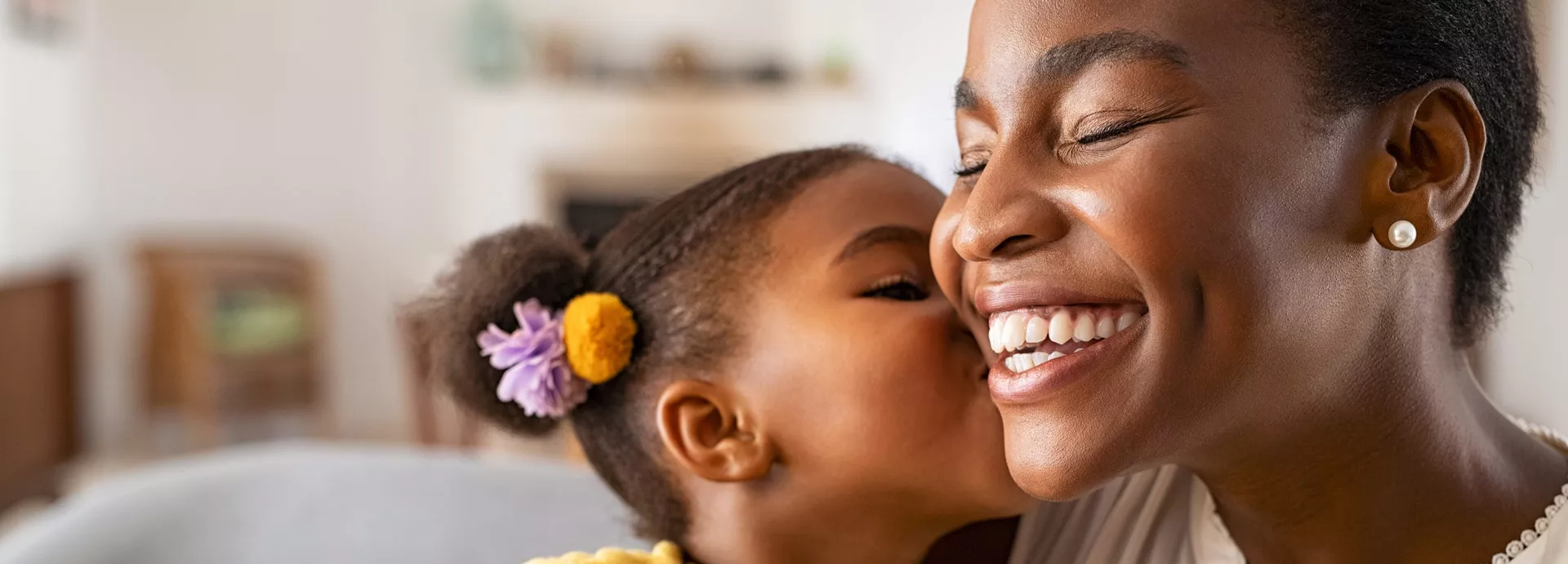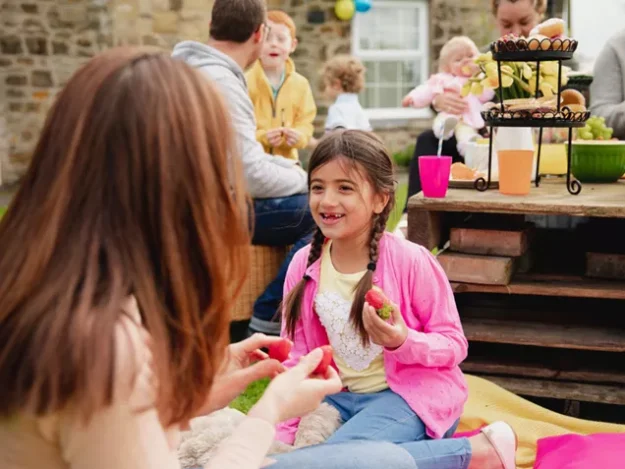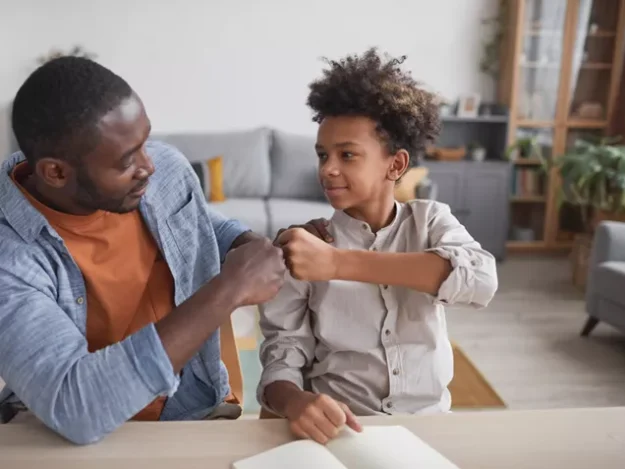If you’re considering becoming a foster parent, it’s important you think about how it will affect your whole family, including your children. Here’s our advice for making a career in fostering a success when you have your own kids at home.
The decision to become a foster parent isn’t one you make overnight. It takes careful consideration and there are a number of things to think about. This is especially true when you already have your own children at home. After all, keeping them safe and protecting their wellbeing will also be a number one priority alongside providing the best care possible for the child you’re looking after.
However, we know from experience that with the right communication, planning and education for children who foster, it can be a truly positive experience. So, here’s everything you need to know about fostering with children to help you make the right decision for you and your family.
Challenges for children who foster
Read about some of the challenges you may need to support your children to overcome…
Skye’s Fostering Story
Watch our interview with Skye, the child of one of our foster families. She shares her experience growing up with foster siblings and why she couldn’t love it more if she tried.
Top tips when fostering with children
The outcomes of the children in care are paramount, but so is the wellbeing of your own children. That’s why it’s important to include them at the very start of your fostering journey so you can plan and prepare together as a family.
Children who foster with their families need to feel heard and respected, and children in foster care need to feel safe, secure and supported. You can do this with:
1) Clear and honest communication from the start
Fostering will change many aspects of your birth child’s life, so they need to be aware of the impact. Explain to them that fostering can be unpredictable and there might be a few bumps in the road, and that another child will also need your time and attention. Give them as much information as possible so nothing is a surprise later down the line.
2) Dedicated time for birth children
Ensure your children don’t ever feel excluded or pushed out by dedicating precious one-on-one time with them. You could schedule it around your foster child’s extra-curricular activities if they have any, or simply allocate certain evenings or afternoons and stick to it so they know it’s important to you.
Open communication throughout a fostering placement. You want your child to feel confident they can come to you with any issue, concern or question they have when a child is in your care. Children who foster should feel empowered to discuss their feelings with their parents, so make sure you establish a family dynamic where you all talk openly together. After all, a problem shared is a problem half solved.
3) Education around trauma and behaviour
The more your child knows about the impacts of childhood trauma, the more they’ll be able to empathise with the child in your care. Explain that their foster sibling may struggle to manage their emotions, which can lead to anger, stress, anxiety or low mood. It’s not their fault they behave this way, and the work you’re doing as a foster parent alongside social workers and other fostering professionals will help them overcome their upsetting pasts.
You could get your children to put themselves in the shoes of looked-after children to better understand them. i.e. ‘how does a child feel after being separated from their own family?’, ‘how does a child feel about staying in a new house with new people?’, ‘how does a child feel when people label them as naughty or bad?’.
4) Healthy relationship building
Depending on their age and personality, most children will naturally begin to play with each other as time goes on, but you might need to help facilitate a relationship. Help them find common ground and encourage them to spend time together.
Of course, you need to be mindful of how comfortable your foster child feels in their new environment, and you should always go at their pace. But having a child already in the home can see them settle in quicker as they have someone with a similar energy and shared interests.
5) Preparation for different outcomes
Arm you child with knowledge of what fostering is and how it works so they can be prepared for any scenario, such as a long-term placement ending, or having to cope with children staying for very short periods of time.
Benefits for children who foster
Fostering can be a truly rewarding experience for the whole family…
I want to foster – how do I talk to my kids about it?
It’s vital that your children are included in your conversations around deciding to become a foster parent. They need to be on board with the decision and feel comfortable with how the family dynamic will inevitably shift. They are an integral part of the family and will play a big role in any foster child’s life. Talking to them about your decision to foster, the reasons why you’re fostering and the process involved is the first step towards making this a success.
- Listen to their concerns and don’t dismiss anything they say as unimportant or not a big deal.
- Educate them on all things fostering, including the not-so-pretty bits and ask them if they have any concerns.
- Let them know they can be as honest and frank with you as they like – this is a big change so it’s better you know their stance, even if it’s not what you want to hear.
- Reassure them that the relationship they have with you won’t change and that they’ll always be loved and included.
- Give them time to reflect on the fostering journey and don’t rush them into fostering if they’re not ready.

How we support children who foster
We want to make sure fostering is a positive endeavour for all the family, so we go above and beyond to support the children who foster with their families. Here are just a few ways we look out for the children of our foster parents.
Frequently asked questions
Can I foster if I have a baby?
It all depends on your individual circumstances. If it’s your first baby and you’ve not had any experience of working with children, it might not be the best time to consider fostering as a career. However, if you have other children, it’s your first child but you’ve had a career working with kids or you’ve fostered before, you could be considered and go on to be an amazing foster parent.
In cases where people foster with their own baby, their situation will be carefully considered in the matching process, ensuring only suitable children are being referred. What’s important is that you’re able to meet the needs of a vulnerable child without affecting the wellbeing of your own baby.
Why do children in foster care need their own bedroom?
Many people ask if their children and foster children can share a room, however, it’s a legal requirement for any foster child over the age of three to have their own room. Just like everybody else, children in foster care deserve space, privacy and a place they can retreat to if they’re feeling stressed, overwhelmed or just want peace and quiet. Having a bedroom to call their own also instils a sense of belonging within the family, which is crucial for making sure they feel loved and wanted.
It’s also a matter of setting boundaries and giving them independence and freedom that will help them grow into healthy, happy young adults. Another reason is due to safeguarding, so separate bedrooms help to keep everyone safe while they get changed, dress themselves and sleep.
How will fostering affect my children who come back during the holidays?
Your spare bedroom must always be available to a child in your care. If your children move away for university and come back during the holidays, you’ll need to make sure there’s another room or place for them to sleep. Children in foster care have already experienced a lot of instability, so it’s important there’s solid consistency within their foster home.
How many children can I foster at a time?
The number of children you can foster at any given time will depend on a number of things, such as your availability, experience and whether you have enough room in your house. Even if you have multiple spare bedrooms, we’ll want to make sure you’re in a position to provide the best care possible.
Siblings in foster care desperately need safe, loving homes to go to, and we’ll always try to keep them together if we can. The children’s placing local authority might decide that some siblings can potentially share a room, depending on their age and if the bedroom has adequate space.

Once I realised that what we were doing was such an incredible thing to do and so rewarding for my entire family, my initial anxieties about fostering went away.”
– Kenya, child who fosters
Download Our Children Who Foster Guide
Help your children discover what it’s like to foster with our Children Who Foster Guide. Fill out your details on the following form to download the guide.
Guide to fostering as a birth child
Please make sure you read our terms and conditions because you’re agreeing to them by submitting an enquiry. It’s also worth reading our privacy policy and cookies policy so you understand how we collect and use your personal data. This site is protected by reCAPTCHA and the Google privacy policy and Terms of Service apply.





